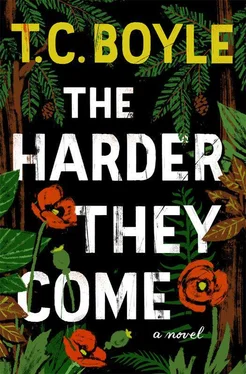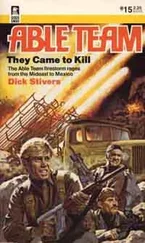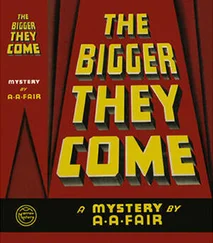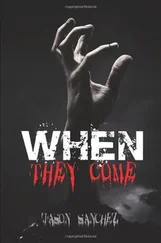“What in hell?” the Dog-Face said. Or no, he barked. Just like a dog.
That was when the other one, his compadre, his backup, became very specific, his face constructing itself in a flash and never mind the hood of the slicker or the rain beads on his shoulders or the poison-gas mist drifting across the ground to conceal his person from view and his purposes too, he was the worst alien of them all, number one, pure poison himself. “Adam?” he said. “What are you—?” He didn’t get to say anything more. There was no need. Just let the Norinco do the talking. Two bursts to spin him around and one to take him down. Smell it on the air. Adios, alien.
“Art!” the Dog-Face was barking and the Dog-Face was next, of course he was, another burst, clean as thrusters, clean as going to hyperspace, but the Dog-Face was taking cover and the Dog-Face was armed with a semi-automatic pistol that talked right back and there was nothing to do but take cover too and let the poison gas bring him down. Either that or outflank him and see how fast he could run.
BIG RIVER WAS THE next watercourse down from the Noyo, and it drained an area of one hundred eighty-one square miles of timberland and spread wide to empty into the ocean just below the village of Mendocino. A sawmill had been built at the mouth of the river in 1852 and for a long while it had been the busiest mill in the county, but all that went defunct in the 1930s, and the mill was gone now, replaced by nothing, by sand, and though the watershed was still viable for timber, it was divided between four companies that milled their logs elsewhere and the Jackson Demonstration Forest, which was open to the public, as were the beaches. And the views. Gaze on the hills, as Sten was doing now, and all you saw from Fort Bragg to the north to Calpurnia in the south was a continuous forest that looked as pristine and untouched as it might have been when the Indians were in possession. The ferns dripped. Banana slugs longer than your hand oozed through the leaf litter. There were patches of ground up there that hadn’t seen direct sunlight in a thousand years.
Sten was in the backyard sitting on the redwood picnic table, his forearms braced on the meat of his thighs and his feet resting on the bench, and he was gazing out on the hills so he wouldn’t have to look into the faces of Rob Rankin and his deputy, Jason Ringwald, who’d played varsity football in high school and was a real little son of a bitch who’d been in the principal’s office more times than Adam, but that was neither here nor there. What he was trying to avoid wasn’t so much their faces — the looks on their faces, stony and cold and heartless — as what they were telling him. He was having trouble with that. He was denying it. Raising every objection he could think of.
“I want you to take a look at something,” Rob was saying, and he was a little man, colorless as a transparency, and there it was in his hand, the thing — one of the things — Sten didn’t want to see. It was a plastic Ziploc bag and inside it was a length of foil that had been molded into a kind of hollowed-out cigarette or pipe. One end was blackened where the match had touched it and the other featured a rounded aperture to draw in air — smoke — which would have been where the traces of DNA would collect. From lips, tongue, fingertips. “You ever see this before? Or anything like it?”
Sten came back to him now, but he had to drop his eyes because he couldn’t let this man — or any man — look inside him and see what he was or how this whole business was twisting in his veins like rusted wire. Thank god Carolee wasn’t here, that was all he could think. Thank god. “I don’t know,” he said.
A gull sailed overhead so that its shadow fell across the sheriff’s face and then lifted again. “At school?” Rob prompted. “Surely you — or whoever — must have confiscated things like this at school.” He paused. “It’s what they call a blunt, for smoking marijuana?”
Sten nodded. He knew what it was. And he knew what was coming too.
“We found this at the Bachman crime scene. Actually, we found two of them. The other one, the second one, was up there where that bunker was?” The sheriff paused a moment to swell his cheeks and let out a long trailing breath, as if the whole thing was too much for him, traipsing from one crime scene to another, hauling things around in plastic bags to confront people with on a day like this, with the sun showing bright all the way up into the stratosphere and not even the faintest stir of a breeze. “And another thing,” gesturing now to his deputy, who must have been all of twenty-two or — three, and if this kid smirked or even thought about it, Sten didn’t know if he could hold himself back, not the way he was feeling now. This was the cue for the deputy, Jason, to hand him another plastic bag, inside of which were shell casings, dull silver in color, as if they’d been tarnished. “You recognize these?”
What could he say? They were shell casings. They could have come from anywhere, from anybody. He shrugged.
“Come on, Sten, I’m trying to tell you something here.”
“All right, then tell me.”
“These are casings from a Chinese assault rifle, not something you see every day around here. A Norinco — what was it, Jason?”
“SKS Sporter. Takes 7.62 millimeter rounds.”
The sheriff was standing there on a patch of grass the rain had reinvigorated, the shoots gone green to replace the yellow that had prevailed for the past six months, new life springing up under the soles of the Belleville flight boots he preferred to standard issue. He had his hands on his hips. “I just wanted to ask,” he said, and his eyes never left Sten’s face, “—your son has a rifle, doesn’t he? Adam?”
This was a cold question and Sten felt a chill all of a sudden though the sun was shining and the bay at the mouth of the river glittered like a heat lamp. Fatherhood. He’d never really wanted it, never sought it, and it had come on him late when Carolee, at the age of thirty-nine, had found herself miraculously pregnant. We’re blessed, she’d told him, her face composed round the news, truly blessed .
“Yeah,” he said, so softly he could scarcely hear himself.
“Chinese-made, isn’t that right?”
“Yeah.”
“What I’m saying is, Sten, and I know this is hard on you, it wasn’t the Mexicans that shot Carey Bachman and they didn’t shoot Art Tolleson either. You know that, don’t you?”
What came next was a detailed account of what had occurred yesterday afternoon on Georgia Pacific property approximately three miles northeast of the house on the Noyo where Adam formerly lived with his grandmother — the house Adam had vandalized because he wasn’t right in the head, because he was angry and upset and never had gotten over the death of Carolee’s mother and the way the world kept letting him down.
“That’s correct, isn’t it?” the sheriff wanted to know. “He did live there, didn’t he?” He drew a pair of drugstore reading glasses from his shirt pocket, shook them out and carefully fitted them over the bridge of his nose to consult the police report the deputy handed him. “At 3772 Forest Road?”
Sten nodded.
“You recall how long?”
“Something like six or seven years now, I guess,” Sten said, his voice gone dead on him. He didn’t want to hear this, but he was going to hear it whether he liked it or not.
The sheriff dropped his eyes to the report and continued, glancing up from time to time to make sure Sten was getting the full impact of it because this was a trial in progress, a prosecutorial marshaling of the facts and make no mistake about it. “It says that the victim, in the company of a local resident, Charles Moody, came across a growing operation at that location — opium poppies, the seedpods of which showed evidence of sap collection, which is illegal in the state of California and everywhere else in the United States as well. You can grow poppies all you want and let them go to seed and use those seeds to grow more poppies or sprinkle them on your bagel or do anything else you want with them, but when you cross the line and start scoring the pods to extract opium, that’s a felony offense, that makes you a narcotics purveyor with intent to sell. You understand what I’m saying?”
Читать дальше












